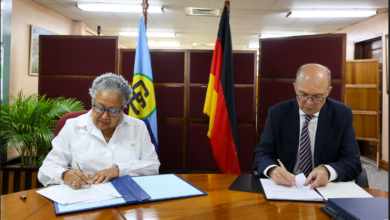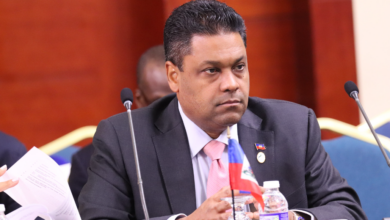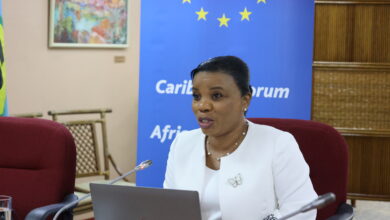The Meeting of Heads of Government of Signatory States of the Grenada Declaration convened in Georgetown, Guyana, on Monday, November 8, 1971. Those attending the Meeting as Leaders of Delegations were the Hon. E.O. Le Blanc, Premier of Dominica, the Hon. L.F.S. Burnham, Prime Minister of Guyana, the Hon. R.L. Bradshaw, Premier of St. Kitts-Nevis-Anguilla, the Hon. R.M. Cato, Premier of St. Vincent and the Hon. D> Sylvester, Minister of Health and Local Government of Grenada. Also present at the meeting were the Secretary-General of the Commonwealth Caribbean Regional Secretariat. Mr. WG. Demas and the Assistant Executive Secretary of the West Indies Associated States (WISA) Secretariat, Mr. A. Compton.
The Heads of Government reviewed developments since they last met in Grenada on July 25. 1971. They expressed regret that other Commonwealth Caribbean Territories had not acceded to the Declaration during the initial three month period provided for this purpose, but welcomed the expression of goodwill for the Declaration by the Government of Trinidad and Tobago and confirmed acceptance of the offer by that Government of financial and personnel support for the action to be taken under it. The Heads of Government also welcomed and acceded to the request by the Government of Barbados for observer status on the Preparatory Committee and the Council of Ministers.
The Heads of Government regretted the public statements attributed to Heads of Government of two Signatory States in relation to the Declaration subsequent to the publication of the Declaration and prior to the convening of the Meeting, and more particularly those statements which called in question the good faith of Signatory Governments. They reaffirmed that the Heads of Government signing the Declaration did so unconditionally and in full recognition of the fact that other Commonwealth Caribbean Countries might not have acceded to the Declaration either initially or not at all. The Heads of Government agreed that it was all the more regrettable that the public statements in question had been made since the procedures provided for under the Declaration had been carefully devised to permit account to be taken of all relevant factors affecting the fulfilment of the goals of political unity and more especially of their determination, in the language of the Declaration, “to create a West Indian nation in which all the peoples of the West Indies may one day be a part”.
The Heads of Government considered that the public expressions of doubt and repudiation attributed to the two Signatory States had strengthened the forces of reaction within and without the Region who work continuously against the advancement of effective West Indian unity and who are resistant to change in the social, political and economic status quo. To this extent, these expressions have impaired progress under the Declaration – even though they cannot altogether frustrate its purpose.
Consistent, therefore with their continuing commitment to the fulfilment of these purposes, the Heads of Government agreed that the processes for achieving political unity under the Declaration must now inevitably be more protracted. To this end, they agreed that the Preparatory Commission which was due to be established on December 1, 1971, would now be established on February, 1, 1972, and that the establishment of the Constituent Assembly scheduled for January 1, 1972, would be deferred until such time as the Preparatory Commission had reached an advanced stage in its work. They recognized that these modifications in the programme must inevitably affect the terminal dates.
The Heads of Government expressed the hope that these extensions in the time-table under the Declaration may provide an opportunity for a continuing dialogue with non-participating Commonwealth Caribbean States so that the spirit of fraternity which pervades the Declaration may yet find expression in the establishment of a West Indian nation of which the vast majority if, indeed, not all the peoples of the West Indies may be a part from the instant of its birth. In this connection, the Heads of Government adverted to and reaffirmed the directives in paragraph (g) of the Grenada Declaration for “the fullest participation of the people of the Region in the formulation of the National Constitution”.
The Heads of Government undertook to pursue within their own States the propagation of the concept of West Indian political unity as exemplified in the Grenada Declaration and to promote a national dialogue with a view to achieving a national and regional consensus.
Simultaneously with action toward the implementation of the Declaration, Heads of Government recognized the importance of proceeding towards fulfilment of the programme of Commonwealth Caribbean economic integration, through the effective advancement of the Caribbean Free Trade Association along the path mapped out in Annex A of the CARIFTA Agreement and in subsequent Decisions of Heads of Government Conferences and CARIFTA Council Meetings (for example, the Harmonization of Fiscal Incentives to Industry; consideration of the adoption of a Common External Tariff and Common Protective Policy; the adoption of Special Mechanisms and Special Measures to assist the Less Developed Countries of CARIFTA; the Rationalisation of Agriculture in the Region; the adoption of a Regional Policy on Location of Industries; the establishment of Regional Integrated Industries; and cooperation in Shipping and Air Transport). They also affirmed their continued support for the Caribbean Development Bank in its efforts to promote the economic development and economic integration of all the Commonwealth Caribbean Countries which are membersof the Bank. They acknowledged that the movement toward political unity was in aid of the integration programme, not in substitution for it, and they reiterated their commitment to the implementation of that programme on as wide a Regional basis as possible. To this end, they directed that the Preparatory Commission should work in close harmony with the Regional Secretariat over the entire field of Regional Economic Integration and functional Cooperation.
In implementation of the procedures established under the Grenada Declaration the Heads of Government agreed on arrangements for the appointment of the Chairman, Members and Staff of the Preparatory Commission. They revised the budget of the Commission, taking account of the offer by the Government of Trinidad and Tobago and settled upon procedures for the involvement of participating States and for keeping informed those Commonwealth Caribbean Governments that have expressed interest in and goodwill for the procedures and objectives of the Declaration.
COMMOMWEALTH CARIBBEAN REGIONAL SECRETARIAT.
Georgetown, Guyana.





